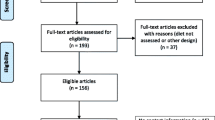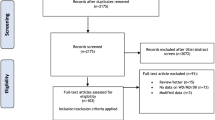Epidemiologic evidence on the relation between nutrition and bladder cancer is reviewed. A role of diet and nutrition in bladder carcinogenisis is plausible since most substances or metabolites, including carcinogens, are excreted through the urinary tract. Ecologic studies on populations have found positive correlations between fats and oils and bladder cancer, but these are reflected only partly in the international differences in bladder cancer rates, which are systematically higher in Europe than in the United States. Ten case-control and three cohort studies of bladder cancer published in English between 1979 and 1994, and including some information on dietary factors, were reviewed. Of seven studies which considered various types and measures of fruit and vegetable consumption, six found a reduced risk with increasing consumption, which was more consistent for vegetables, with relative risk (RR) estimates between 0.5 and 0.7 for the highest cf the lowest consumption level. There is, therefore, suggestive evidence that a diet rich in fresh fruit and vegetables is a correlate-or an indicator-of reduced bladder cancer risk. No clear association emerged for other foods investigated, including meat and milk. With reference to nutrients, total fat intake was related to bladder cancer risk in three case-control studies, with relative risks between 1.4 and 1.7 for the highest cf the lowest consumption level. However, no relationship between fats and bladder cancer emerged in c cohort study on Japneese-Americans in Hawaii. No consistent association emerged between protein or carbohydrate consumption and bladder cancer risk. Among micronutrients, vitamin A, and particularly carotenoids, showed an inverse association with bladder cancer risk in four case-control studies, including one allowing for a measure of total caloric intake, but were not related consistently in two other studies. There oere only scattered and inconclusive data on vitamin C and E. Finally, two studies suggested that calcium and sodium and sodium may be related to bladder cancer risk. Thus, available data on diet and bladder cancer are still inconclusive. This is at least partly attributable to the limited number of cohort studies and the paucity of case-control studies, including satisfactorily detailed and validated dietary questionnaires. Despite these limitations, available data suggest that a diet rich in fresh fruit and vegetables, and, hence, possibly in carotenoids, is a correlate of reduced bladder cancer risk.
Similar content being viewed by others
References
Matanoski GM, Elliot EA. Bladder cancer epidemiology. Epidemiol Rev 1981; 3:203–29.
Levi F, Lucchini F, La Vecchia C. Worldwide patterns of cancer mortality, 1985–89. Eur J Canver Prev 1994; 3:109–43.
Willett W, Stampfer MJ. Total energy intake: implications for epidemiologic analyses. Am J Epidemiol 1986; 124:17–27.
Armstrong B, Doll R. Environmental factors and cancer incidence and mortality in different countries, with special reference to dietary practice. Int J Cancer 1975; 15:617–31.
Hebbert JR, Miller DR. A cross-national investigation of diet and bladder cancer. Eur J Cancer 1994; 30a:778–84.
Mettlin C, Graham S. Dietary risk factors in human bladder cancer. Am J Epidemiol 1979; 110:255–63.
Claude J, Kunze E, Frentzel-Beyme R, Paczkowski K, Schneider J, Schubert H. Life-style and occupational risk factors in cancer of the lower urinary tract. Am J Epidemiol 1986; 124:578–89.
Risch HA, Burch JD, Miller AB, Hill GB, Steele R, Howe GR. Dietary factors and the incidence of cancer of the urinary bladder. Am J Epidemiol 1988; 127:1179–91.
Slattery ML, West DW, Robison LM. Fluid intake and bladder cancer in Utah. Int J Cancer 1988; 42:17–22.
La Vecchia C, Negri E, Decarli A, D'Avanzo B, Liberati C, Franceschi S. Dietary factors in the risk of bladder cancer. Nutr Cancer 1989; 12:93–101.
Steineck G, Hagman U, Gerhardsson M, Norell SE. Vitamin A supplements, fried foods, fat and urothelial cancer. A case-referent study in Stockholm in 1985–1987. Int J Cancer 1990; 45:1006–11.
Riboli E, Gonzales CA, Lopez-Abente G, et al. Diet and bladder cancer in Spain: a multi-centre case-control study. Int J Cancer 1991; 49:214–9.
Nomura AMY, Kolonel LN, Hankin JH, Yoshizawa CN. Dietary factors in eancer of the lower urinary tract. Int J Cancer 1991; 48:199–205.
Vena JE, Graham S, Freudenheim J, et al. Diet in the epidemiology of bladder cancer in Western New York. Nutr Cancer 1992; 18:255–64.
Momas I, Daures JP, Festy B, Bontoux J, Gremy F. Relative importance of risk factors in bladder carcinogenesis: some new results about Mediterranean habits. Cancer Cause Control 1994; 5:326–32.
Steineck G, Norell SE, Feychting M. Diet, tobacco and urothelial cancer. A 14-year follow-up of 16,477 subjects. Acta Oncol 1988; 27:323–7.
Mills PK, Beeson L, Phillips RL, Fraser GE. Bladder cancer in a low risk population: results from the Adventist health study. Am J Epidemiol 1991; 133:230–9.
Chyou PH, Nomura AMY, Stemmermann GN. A prospective study of diet, smoking, and lower urinary tract cancer. Ann Epidemmiol 1993; 3:211–16.
Ohno Y, Aoki K, Obata K, Morrison AS. Case-control study of urinary bladder cancer in Metropolitan Nagoya. Natl Cancer Inst Monogr 1985; 69:229–34.
La Vecchia C, Negri E, Franceschi S, Parazzini F, Decarli A. Differences in dietary intake with smoking, alcohol, and education. Nutr Cancer 1992; 17:297–304.
Margetts BM, Jackson AA. Interactions between people's diet and their smoking habits: the dietary and nutritional survey of British adults. Br Med J 1993; 307:1381–4.
D'Avanzo B, La Vecchia C, Negri E, Decarli A, Benichou J. Atributable risks for bladder cancer in Northern Italy. Ann Epidemiol 1995; 5:427–31.
Kolonel LN, Hinds MW, Nomura AMY, Hankin JH, Lee J. Relationship of dietary vitamin A and ascorbic acid intake to the risk for cancers of the lung, bladder and prostate in Hawaii. NCI Monogr 1985; 69:137–42.
Peto R, Doll R, Buckley JD, Sporn MB. Can dietary betacarotene materially reduce human cancer rates? Nature 1981; 290:201–8.
Peto R. The marked difference between carotenoids and retinoids: methodological implications for biochemical epidemiology. Cancer Surv 1983; 2:327–40.
Cohen SM, Ellwein LB, Okamura T, et al. Comparative bladder tumor promoting activity of sodium saccharin, sodium ascorbate, related acids, and calcium salts in rats. Cancer Res 1991; 51:1766–77.
Steinmetz KA, Potter JD. Vegetables, fruit, and cancer. II. Mechanisms. Cancer Causes Control 1991; 2:426–42.
Author information
Authors and Affiliations
Additional information
This work was conducted within the framework of the CNR (Italian National Research Council) Applied Project ‘Clinical Applications of Oncological Research’ (Contracts No. 94.01321.PF39), and with the contributions of the Italian Association for Cancer Research and the Italian League Against Tumors, Milan.
Rights and permissions
About this article
Cite this article
La Vecchia, C., Negri, E. Nutrition and bladder cancer. Cancer Causes Control 7, 95–100 (1996). https://doi.org/10.1007/BF00115641
Received:
Accepted:
Issue Date:
DOI: https://doi.org/10.1007/BF00115641




